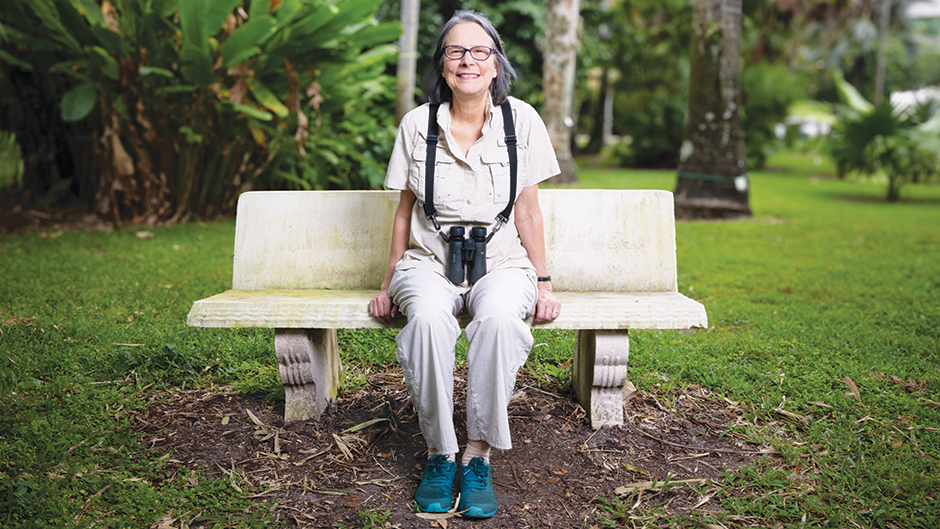A still and warm morning breaks over South Florida under robin’s egg-blue skies. Traffic hums in the distance, but the sky above A.D. “Doug” Barnes Park is alive with bird song. More than a dozen women—30-somethings to boomers, clad in the colors of the woodlands, gather in a circle of folding chairs, faces upturned.
Among the group of all-female birders is Professor Donna Coker, a nationally recognized scholar on intimate partner violence and restorative justice but known in the bird group as an avid spotter of flight and feather.
Coker has been birdwatching on and off for a couple of decades, though the professor confesses that recently, she has been more off. “And when off, my skills go downhill fast.” Nevertheless, she has spotted and identified dozens of birds as the park sits on the migratory route of many birds.
She is one of the rarified birders who has experienced the March migration stop of roughly 1 million sandhill cranes along the Platte River in Nebraska.
“I love that birding gets me outdoors, and I find birds endlessly fascinating, but what I love about birding—that is, the viewing and identifying of birds—is that it requires intense focus,” said Coker. “You need to pay attention to your location, time of year; you must pay attention to bird behavior, size, and calls. It’s that pay attention quality that makes it so rewarding.”
Coker grew up in a college town in Searcy, Arkansas, where her dad was a minister and the dean of the education department at Harding University. Her mother was a schoolteacher and later taught in the curriculum lab in Harding’s education department. Growing up with three sisters and a brother, much of their lives were university—and church-centric.
Coker considered several career paths as she was finishing high school: journalism, “this was the era when Barbara Walters was a thing, and I was really interested in people and ideas,” she said. “And writing was a way to have an influence on the world.
“But also, this was coming up at the tail end of the war on poverty. Before we moved to the city, I had seen rural poverty. My parents instilled in me the importance of helping people. Plus, I was a voracious reader of news magazines, and they were really focusing on community organizing, the problems of the inner-city, and low-income communities,” she said. “This was also a time when the women’s movement was becoming prominent.”
She ended up getting a bachelor’s and master’s degrees in social work from Harding and the University of Arkansas at Little Rock, which would yield her first up-close and personal experience with what would guide her career and scholarship. It would also lead to her future husband, Tom Dukowitz.
“I ended up doing a practicum at a newly opened shelter for battered women in Little Rock,” she says. “I saw this as an opportunity to be involved in furthering women’s equality.”
A fortuitous downpour took Coker to deliver an umbrella to her roommate, who had a temp job at the University of Arkansas Medical School. Coker crossed paths with a cute med student who was getting drenched. Now, two kids and half a dozen moves later, it’s still a rom-com movie in the making.
One of those moves led Coker to don the binoculars and add birder to her life story, leading to the million-crane moment.
Med school Tom became Dr. Tom, then Navy Lieutenant Commander Tom, and Coker started using her social work degrees in what was called at the time “the battered women’s movement.” She would stay in the field for 11 years, working in shelters and community organizations in Little Rock and then Honolulu, where Dukowitz was stationed.
As Dukowitz was finishing his naval career in northern California, Coker headed to Stanford Law, followed by a turn at a prestigious San Francisco firm doing litigation.
“After two years, I quit the firm, and I started teaching at Stanford and Santa Clara Law Schools. I was also doing lobbying work with the California state legislature for the California Coalition Against Domestic Violence. I always knew that I wanted to be an academic. Before I left the firm, I published an article and prepared to enter the academic marketplace.”
Miami Law came calling, and for a while, Coker was in Miami with her youngest, Jacob, and Dukowitz was in Palo Alto with their oldest, Zachary. Eventually, everyone ended up in Miami, and Miami Law became her home.
After her stint as associate dean, Coker took off a year. Dukowitz had transitioned from medicine to art. The couple moved to Southern Pines, North Carolina, where Dukowitz studied at the Academy of Classical Design.
“Birding was big, big, big there, and we became good friends with a couple who were both ornithologists,” she said. “They had been studying the red-cockaded woodpecker for years. And we joined a naturalist’s society.”
From there, she was hooked. A wedding anniversary celebration led Coker and Dukowitz to “the coolest birding experience ever”—the Nebraska flatlands to watch the great sandhill crane migration.
“You are out before the sun comes up, and you are surrounded by thousands of these sandhill cranes just waking up,” she says. “They make a very loud honking sound. It’s the most spectacular thing ever.”
Read more stories from the spring 2024 Miami Law magazine.

